人教版(2019)必修第二册 Unit 4 History and traditions Reading for Writing课件(共27张PPT)
文档属性
| 名称 | 人教版(2019)必修第二册 Unit 4 History and traditions Reading for Writing课件(共27张PPT) |
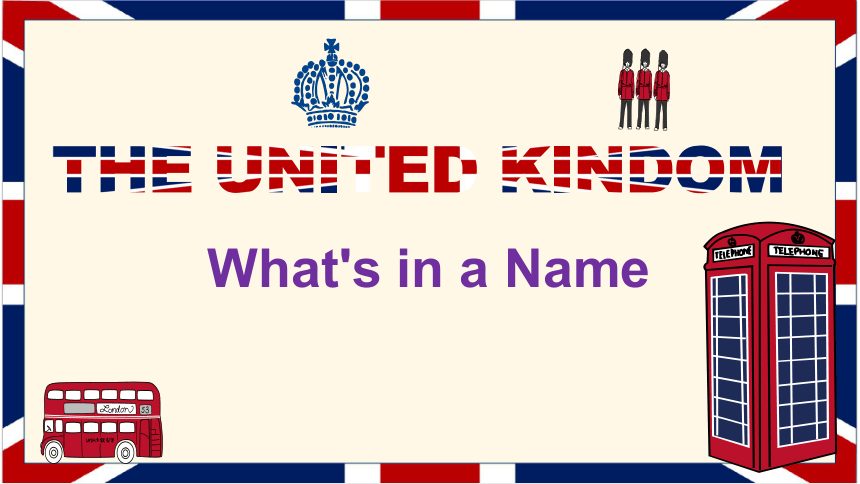
|
|
| 格式 | pptx | ||
| 文件大小 | 16.3MB | ||
| 资源类型 | 教案 | ||
| 版本资源 | 人教版(2019) | ||
| 科目 | 英语 | ||
| 更新时间 | 2025-08-23 00:00:00 | ||
图片预览

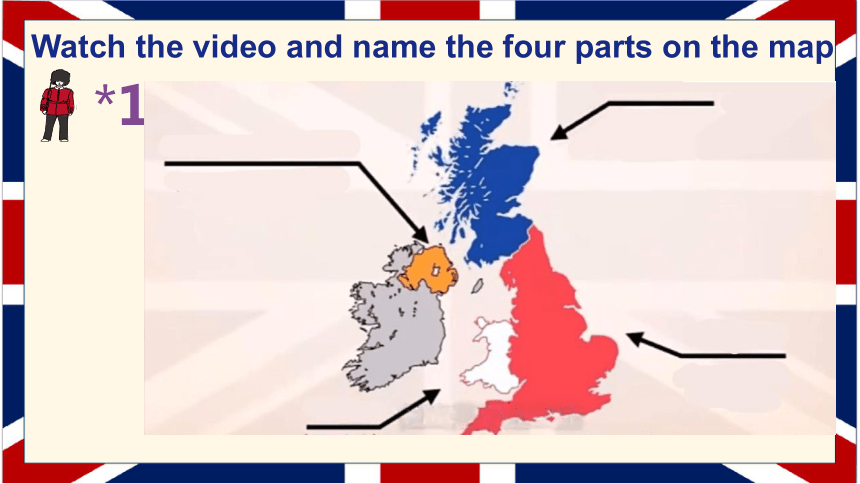
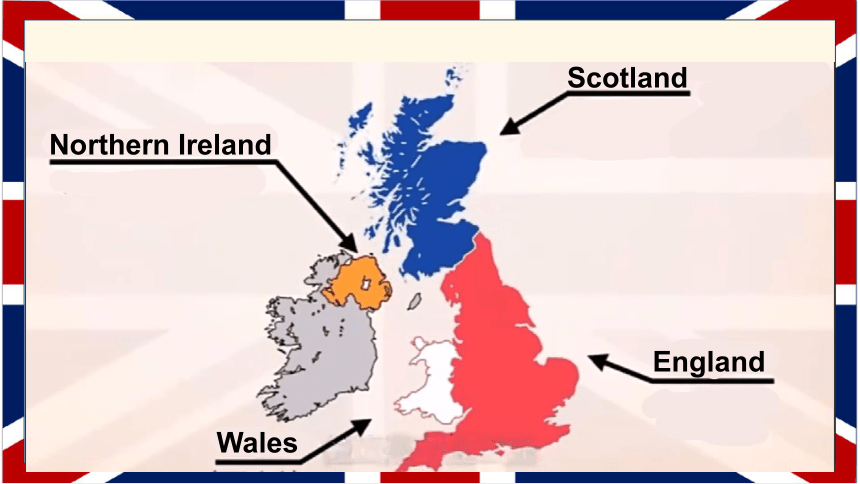
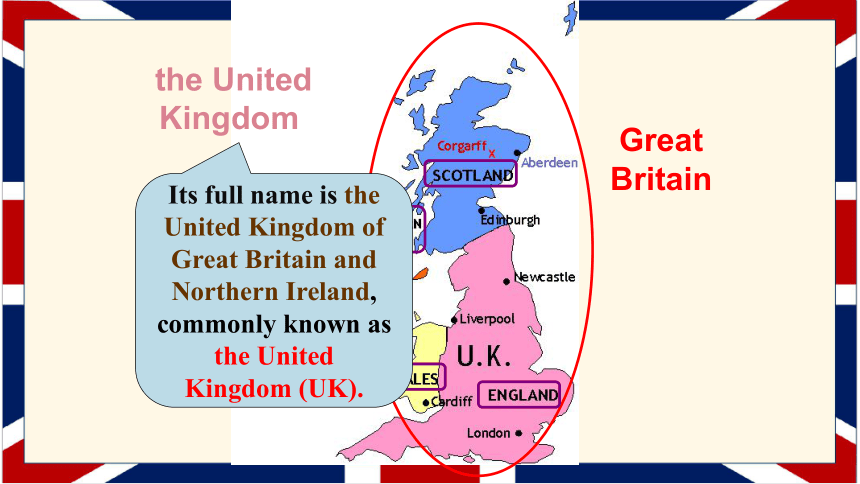
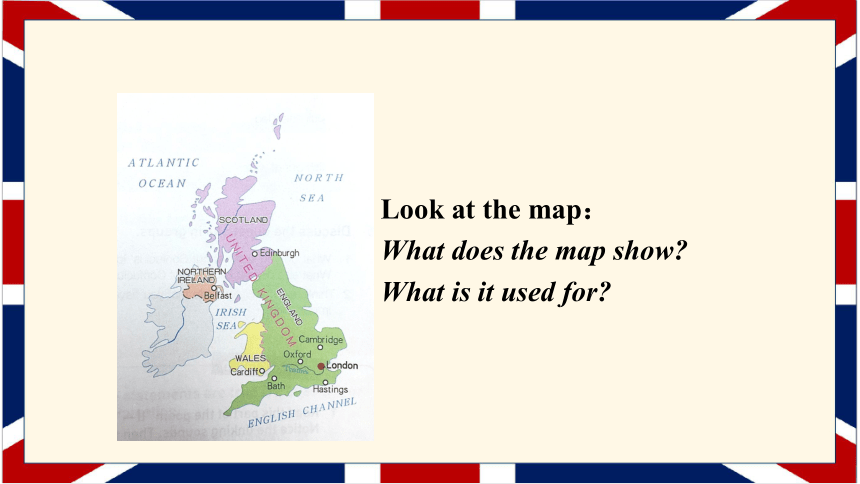
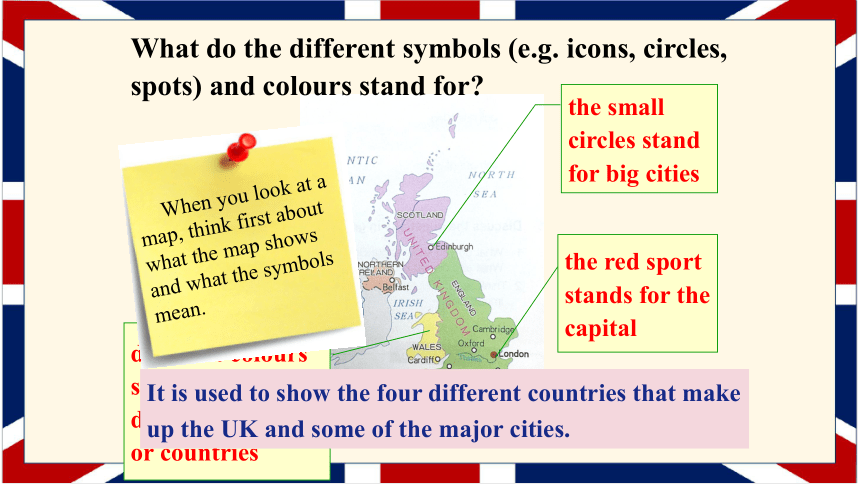
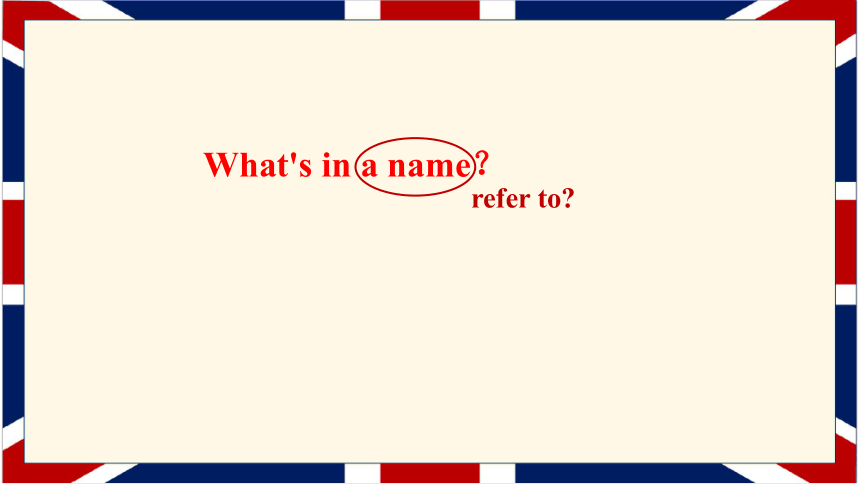
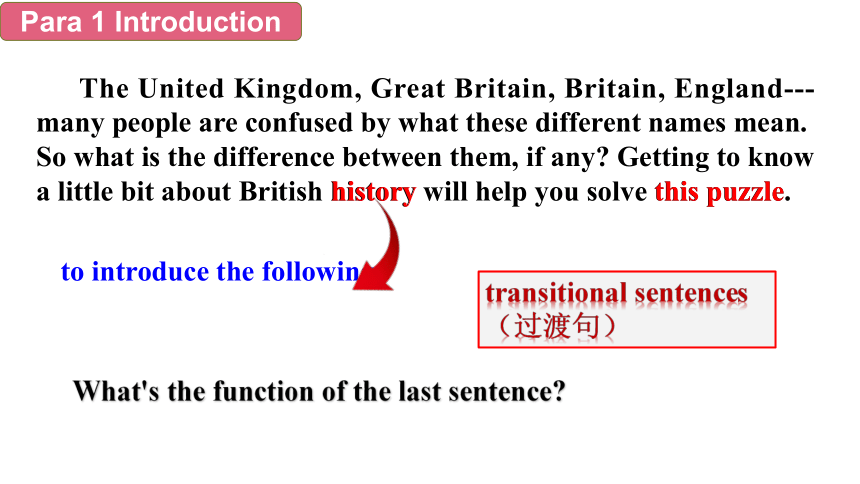
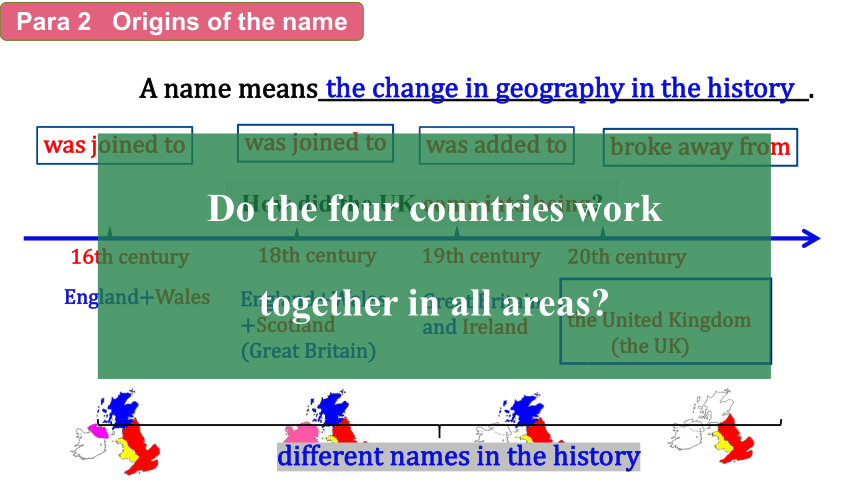
文档简介
(共27张PPT)
THE UNITED KINDOM
What's in a Name
延迟符号
Watch the video and name the four parts on the map
*1
England
Scotland
Northern Ireland
Wales
Great Britain
the United Kingdom
Its full name is the United Kingdom of Great Britain and Northern Ireland, commonly known as the United Kingdom (UK).
Look at the map:
What does the map show
What is it used for
the small circles stand for big cities
the red sport stands for the capital
different colours stand for different regions or countries
What do the different symbols (e.g. icons, circles, spots) and colours stand for
When you look at a map, think first about what the map shows and what the symbols mean.
It is used to show the four different countries that make up the UK and some of the major cities.
What's in a name?
refer to
The United Kingdom, Great Britain, Britain, England---many people are confused by what these different names mean. So what is the difference between them, if any Getting to know a little bit about British history will help you solve this puzzle.
this puzzle
to introduce the following
history
Para 1 Introduction
What's the function of the last sentence
transitional sentences (过渡句)
16th century
18th century
19th century
20th century
England+Wales
England+Wales
+Scotland
(Great Britain)
Great Britain
and Ireland
Great Britain
and Northern
Ireland
different names in the history
A name means______________________________________________.
the change in geography in the history
was joined to
was joined to
was added to
broke away from
Para 2 Origins of the name
How did the UK come into being
the United Kingdom
(the UK)
Do the four countries work
together in all areas
Part3 Similarities and differences
Similarities: _____; ________;________________
Differences: ___________and __________ systems; ___________________ and even______________ for competitions.
currency
flag
military defence
educational
legal
their own traditions
football teams
Reading tip:
Giving examples (for example; like)can help readers understand the point more easily and more convincing.
How does the writer develop this paragraph
Time Events Changes
1st century
Romans arrived
included towns and roads
5th century
Anglo-Saxons came
introduced English language;
changed the way to build houses
8th century
Vikings came
left behind new vocabulary and
the names of many locations
11th century
Normans came
had castles built; made changes
to legal system; French words
entered
rich culture
a long history
different groups
Four groups of people brought different cultures to the country.
Para4 People and traditions
history culture & modern culture
old tradition & new tradition
past & present
connect:
A facsinating mix
Para 5 Tourism
Para. 4
①
According to para 4&5, what are the two chief advantages of studying the history of a country
Para. 5
②
It can help you understand much about the country and its traditions.
Studying the history of the country will make your visit much more enjoyable.
WHAT'S IN A NAME
What does “a name” refer to in the passage
a different name
throughout history
The United Kingdom
Great Britain
Britain
England
In a name, there is _________________.
a history
Post-reading
To arouse readers' interest in the text and continue to read it.
Further thinking
Q4: In the history of the UK, a name of a country can be changed, what about the culture and traditions formed in the long history
(Please find out the evidence from the text to support your opinion.)
Almost everywhere you go in the UK, you will be surrounded by evidence of four different groups of people who took over at different times throughout history.
…as it is an ancient port city that has a history dating all the way back to Roman times. There are an countless historic sites to explore, …museums with ancient relics…
… For example, England, Wales, Scotland, and Northern Ireland all have different education systems and legal systems. …their own traditions, like their own national days and national dishes. …their own football teams for competitions like the World Cup!
Culture has
a profound influence on a country and is rooted in people's mind.
a tip:
Learn about a country through its history.
…The UK is a fascinating mix of history and modern culture, with both new and traditions.…If you keep your eyes open… you can see both its past and its present.
The United Kingdom, Great Britain, Britain, England—many people are confused by what these different names mean. So what is the difference between them, if any Getting to know a little bit about British history will help you solve this puzzle.
In the 16th century, the nearby country of Wales was joined to the Kingdom of England. Later, in the 18th century, the country Scotland was joined to create the Kingdom of Great Britain. In the 19th century, the Kingdom of Ireland was added to create the United Kingdom of Great Britain and Ireland. Finally, in the 20th century, the southern part of Ireland broke away from the UK, which resulted in the full name we have today: the United Kingdom of Great Britain and Northern Ireland. Most people just
use the shortened name: "the United Kingdom" or "the UK". People from the UK are called "British", which means the UK is also often referred to as Britain or Great Britain.
if的省略句
if so 如果是这样的话
if not 如果不是这样;不然,否则
if necessary 如果有必要的话
if possible 如果可能的话
if ever 如果曾经有的话
break up 分解;解散;(关系)破裂
break out (战争、火灾、疾病等)爆发 e.g. The war broke out.
break down 机器故障;物质分解;情感崩溃;消除
break into + 地点 闯入
break in 打断;插嘴说;闯入
e.g. He broke in when we were having breakfast.
He broke into the room when we were having breakfast.
result from+原因 result in+结果 = lead to
e.g. 他的粗心导致了这起车祸。
The car accident resulted from his carelessness.
His carelessness resulted in the car accident.
refer to 提及,谈到,指的是,参考,查阅
refer to A as B 把A称为B A is referred to as B
The four countries that belong to the United Kingdom work together in some areas. They use the same flag, known as the Union Jack, as well as share the same currency and military defence. However, they also have some differences. For example, England, Wales, Scotland, and Northern Ireland all have different education systems and legal systems. They also have their own traditions, like their own national days and national dishes. And they even have their own football teams for competitions like the World Cup!
The United Kingdom has a long and interesting history. Exploring it can help you understand much more about the country and its traditions. Almost everywhere you go in the UK, you will be surrounded by evidence of four different groups of people who took over at different times throughout history. The first group, the Romans, came in the first century. They built the first towns and good roads.
belonging to
The United Kingdom has a long and interesting history __________ (explore), _________ can help you understand much more about the
to explore
which
, some of their great achievements
__________(include) building towns and roads.
including
Next, the Anglo-Saxons arrived in the fifth century. They introduced the beginnings of the English language, and changed the way people built houses. The vikings came in the eighth century, left behind lots of new vocabulary, and also the names of many locations across the UK. The last group were the Normans. They conquered England after the well-known Battle of Hastings in the 11th century. They had castles built all around England, and made changes to the legal system. The Normans were French, so many French words slowly entered into the English language.
the way (that/in which) people built houses
have/get sth. done 使某事被做
e.g. I have my hair cut/clothes washed.
enter+地点
enter into 成为......的一部分,影响
There is so much more to learn about the interesting history and culture of the United Kingdom. Studying the history of the country will make your visit much more enjoyable. The capital city London is a great place to start, as(=because) it is an ancient port city that has a history dating all the way back to Roman times.
that dates
There are countless historic sites to explore, and lots of museums with ancient relics from all over the UK. The UK is a fascinating mix of history and modern culture, with both new and old traditions. If you keep your eyes open, you will be surprised to find that you can see both its past and its present.
sb. be surprised/amazed/excited/delighted to do
e.g. I’m delighted to hear that you have been admitted into Zhejiang University.
Is it necessary for visitors to study the history and culture of a country before visiting it
We’d better know about the history and culture, because...
In my opinion, ...
I think that...
In a word, ...
Group Discussion
1. If you were to give foreigners some suggestions on visiting China, which period of China’s long history would you advise them to study before their visit
2. Which city do you think is a great place for them to start in China
Homework
Read the text again and recite the expressions you like.
Finish writing the following letter after class.
One possible version
Dear Jim,
It’s nice to hear from you. I’m writing to share with you some suggestions for your visit to China.
Knowing a little Chinese history will be helpful when you visit China. First, it can help you understand a lot about our country and our traditions. Second, it can make your visit much more enjoyable.
If you visit China, I recommend Xi’an is a great place to start. It’s an ancient city with an interesting history. There are countless historic sites for you to explore, and lots of museums with ancient items from all over China. If you keep your eyes open, you will be surprised to find that you can see both its past and its present.
Looking forward to your arrival.
Yours,
Li Hua
A people without the knowledge of their past history, origin and culture is like a tree without roots.
——Marcus Garvey
Assignment
What's in the name of your city
Do you know his former names
Which traditions and culture in your city puzzle you
Learn about your city through its history and introduce it to your classmates next class.
THE UNITED KINDOM
What's in a Name
延迟符号
Watch the video and name the four parts on the map
*1
England
Scotland
Northern Ireland
Wales
Great Britain
the United Kingdom
Its full name is the United Kingdom of Great Britain and Northern Ireland, commonly known as the United Kingdom (UK).
Look at the map:
What does the map show
What is it used for
the small circles stand for big cities
the red sport stands for the capital
different colours stand for different regions or countries
What do the different symbols (e.g. icons, circles, spots) and colours stand for
When you look at a map, think first about what the map shows and what the symbols mean.
It is used to show the four different countries that make up the UK and some of the major cities.
What's in a name?
refer to
The United Kingdom, Great Britain, Britain, England---many people are confused by what these different names mean. So what is the difference between them, if any Getting to know a little bit about British history will help you solve this puzzle.
this puzzle
to introduce the following
history
Para 1 Introduction
What's the function of the last sentence
transitional sentences (过渡句)
16th century
18th century
19th century
20th century
England+Wales
England+Wales
+Scotland
(Great Britain)
Great Britain
and Ireland
Great Britain
and Northern
Ireland
different names in the history
A name means______________________________________________.
the change in geography in the history
was joined to
was joined to
was added to
broke away from
Para 2 Origins of the name
How did the UK come into being
the United Kingdom
(the UK)
Do the four countries work
together in all areas
Part3 Similarities and differences
Similarities: _____; ________;________________
Differences: ___________and __________ systems; ___________________ and even______________ for competitions.
currency
flag
military defence
educational
legal
their own traditions
football teams
Reading tip:
Giving examples (for example; like)can help readers understand the point more easily and more convincing.
How does the writer develop this paragraph
Time Events Changes
1st century
Romans arrived
included towns and roads
5th century
Anglo-Saxons came
introduced English language;
changed the way to build houses
8th century
Vikings came
left behind new vocabulary and
the names of many locations
11th century
Normans came
had castles built; made changes
to legal system; French words
entered
rich culture
a long history
different groups
Four groups of people brought different cultures to the country.
Para4 People and traditions
history culture & modern culture
old tradition & new tradition
past & present
connect:
A facsinating mix
Para 5 Tourism
Para. 4
①
According to para 4&5, what are the two chief advantages of studying the history of a country
Para. 5
②
It can help you understand much about the country and its traditions.
Studying the history of the country will make your visit much more enjoyable.
WHAT'S IN A NAME
What does “a name” refer to in the passage
a different name
throughout history
The United Kingdom
Great Britain
Britain
England
In a name, there is _________________.
a history
Post-reading
To arouse readers' interest in the text and continue to read it.
Further thinking
Q4: In the history of the UK, a name of a country can be changed, what about the culture and traditions formed in the long history
(Please find out the evidence from the text to support your opinion.)
Almost everywhere you go in the UK, you will be surrounded by evidence of four different groups of people who took over at different times throughout history.
…as it is an ancient port city that has a history dating all the way back to Roman times. There are an countless historic sites to explore, …museums with ancient relics…
… For example, England, Wales, Scotland, and Northern Ireland all have different education systems and legal systems. …their own traditions, like their own national days and national dishes. …their own football teams for competitions like the World Cup!
Culture has
a profound influence on a country and is rooted in people's mind.
a tip:
Learn about a country through its history.
…The UK is a fascinating mix of history and modern culture, with both new and traditions.…If you keep your eyes open… you can see both its past and its present.
The United Kingdom, Great Britain, Britain, England—many people are confused by what these different names mean. So what is the difference between them, if any Getting to know a little bit about British history will help you solve this puzzle.
In the 16th century, the nearby country of Wales was joined to the Kingdom of England. Later, in the 18th century, the country Scotland was joined to create the Kingdom of Great Britain. In the 19th century, the Kingdom of Ireland was added to create the United Kingdom of Great Britain and Ireland. Finally, in the 20th century, the southern part of Ireland broke away from the UK, which resulted in the full name we have today: the United Kingdom of Great Britain and Northern Ireland. Most people just
use the shortened name: "the United Kingdom" or "the UK". People from the UK are called "British", which means the UK is also often referred to as Britain or Great Britain.
if的省略句
if so 如果是这样的话
if not 如果不是这样;不然,否则
if necessary 如果有必要的话
if possible 如果可能的话
if ever 如果曾经有的话
break up 分解;解散;(关系)破裂
break out (战争、火灾、疾病等)爆发 e.g. The war broke out.
break down 机器故障;物质分解;情感崩溃;消除
break into + 地点 闯入
break in 打断;插嘴说;闯入
e.g. He broke in when we were having breakfast.
He broke into the room when we were having breakfast.
result from+原因 result in+结果 = lead to
e.g. 他的粗心导致了这起车祸。
The car accident resulted from his carelessness.
His carelessness resulted in the car accident.
refer to 提及,谈到,指的是,参考,查阅
refer to A as B 把A称为B A is referred to as B
The four countries that belong to the United Kingdom work together in some areas. They use the same flag, known as the Union Jack, as well as share the same currency and military defence. However, they also have some differences. For example, England, Wales, Scotland, and Northern Ireland all have different education systems and legal systems. They also have their own traditions, like their own national days and national dishes. And they even have their own football teams for competitions like the World Cup!
The United Kingdom has a long and interesting history. Exploring it can help you understand much more about the country and its traditions. Almost everywhere you go in the UK, you will be surrounded by evidence of four different groups of people who took over at different times throughout history. The first group, the Romans, came in the first century. They built the first towns and good roads.
belonging to
The United Kingdom has a long and interesting history __________ (explore), _________ can help you understand much more about the
to explore
which
, some of their great achievements
__________(include) building towns and roads.
including
Next, the Anglo-Saxons arrived in the fifth century. They introduced the beginnings of the English language, and changed the way people built houses. The vikings came in the eighth century, left behind lots of new vocabulary, and also the names of many locations across the UK. The last group were the Normans. They conquered England after the well-known Battle of Hastings in the 11th century. They had castles built all around England, and made changes to the legal system. The Normans were French, so many French words slowly entered into the English language.
the way (that/in which) people built houses
have/get sth. done 使某事被做
e.g. I have my hair cut/clothes washed.
enter+地点
enter into 成为......的一部分,影响
There is so much more to learn about the interesting history and culture of the United Kingdom. Studying the history of the country will make your visit much more enjoyable. The capital city London is a great place to start, as(=because) it is an ancient port city that has a history dating all the way back to Roman times.
that dates
There are countless historic sites to explore, and lots of museums with ancient relics from all over the UK. The UK is a fascinating mix of history and modern culture, with both new and old traditions. If you keep your eyes open, you will be surprised to find that you can see both its past and its present.
sb. be surprised/amazed/excited/delighted to do
e.g. I’m delighted to hear that you have been admitted into Zhejiang University.
Is it necessary for visitors to study the history and culture of a country before visiting it
We’d better know about the history and culture, because...
In my opinion, ...
I think that...
In a word, ...
Group Discussion
1. If you were to give foreigners some suggestions on visiting China, which period of China’s long history would you advise them to study before their visit
2. Which city do you think is a great place for them to start in China
Homework
Read the text again and recite the expressions you like.
Finish writing the following letter after class.
One possible version
Dear Jim,
It’s nice to hear from you. I’m writing to share with you some suggestions for your visit to China.
Knowing a little Chinese history will be helpful when you visit China. First, it can help you understand a lot about our country and our traditions. Second, it can make your visit much more enjoyable.
If you visit China, I recommend Xi’an is a great place to start. It’s an ancient city with an interesting history. There are countless historic sites for you to explore, and lots of museums with ancient items from all over China. If you keep your eyes open, you will be surprised to find that you can see both its past and its present.
Looking forward to your arrival.
Yours,
Li Hua
A people without the knowledge of their past history, origin and culture is like a tree without roots.
——Marcus Garvey
Assignment
What's in the name of your city
Do you know his former names
Which traditions and culture in your city puzzle you
Learn about your city through its history and introduce it to your classmates next class.
